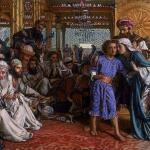
I never knew how I’d broach the truth about Santa to my daughter, Rosie.
I don’t really remember how I told her the myth about Santa in the first place. I think I told her “a lot of people believe that Santa Claus comes down the chimney to give gifts at Christmas, but of course I’ve never seen such a person,” and pop culture took it from there. She firmly believed in Santa. For awhile in there, she also believed that Santa gave her her birthday presents and Easter basket. She learned about Saint Nicholas from our Eastern Catholic church, of course, but she thought of Saint Nicholas and Santa as two different people. Saint Nicholas comes from Heaven in a bishop’s robe and miter on the sixth of the month and puts chocolate in your boots; Santa comes from the North Pole in a woolly red suit on the twenty-fourth and puts Star Wars action figures under the tree. They couldn’t possibly be the same person.
This year, Rosie deduced the truth on her own. I mentioned something about putting an item on the list for Santa, and Rose said, “Or for you and Daddy, since Santa isn’t real.”
“Ah,” I said. “You figured it out. Yes. Santa isn’t exactly a real person. Santa is a myth. Myths are untrue stories that people tell to help them understand true things. They’re a kind of truth, just not literal truth. Santa is a myth to help us understand the beauty of giving gifts to those we love and making people happy without expecting anything in return. He comes from the story of Saint Nicholas, a real person, a saint who used to throw money through poor people’s windows at night. But it’s best not to let on that we know, so that we don’t disappoint other people who don’t know yet. Don’t you think?”
Rose agreed.
And so, this year, we’ve agreed to pretend about Santa, and do good deeds in his name. Rosie alternately asks for presents from me and from Santa; she dictated a list for Santa to me and still wants to see the Santa at the mall, but she understands more readily now when she asks for an expensive item and I stammer that Santa can’t always bring expensive things in his magic sack. When we go shopping, I ask her opinion on little Christmas treats for our friends at the Friendship Room and she helps me select what to get, so that Rosie can be a Santa too.
The word “Santa” means “Holy,” after all, and I want her to be holy.
I told Rose the myth about Santa, using the wording of “Lots of people think,but I’ve never seen him myself.” I told her about the big red suit, the chimneys, the cookies and milk. We even discussed flying reindeer. But there is one thing I never told Rosie about Santa.
I never told her he only brings toys to good boys and girls, or that he neglects bad ones.
I never told her this, because Santa is a myth– not just a lie but a sacred kind of story, a story told to reveal a deeper truth. And I couldn’t find anything remotely truthful about Christmas being a time for gifts only as a reward for good behavior. That’s the opposite of what Christmas is.
It was a wise friend of mine with children older than Rosie who pointed this out for me. “I can’t tell my kids that Santa only brings toys for good children and gives coal and sticks to bad ones,” she said. “The whole point of Christmas is that we were very bad, so God the Father gave us the best gift of all.”
That is the whole point of Christmas– in fact, it’s the whole point of Christianity. We were bad boys and girls, the worst we could manage to be. Our Father placed us in paradise but we threw paradise away and hid from Him, so our Father decided to save us through a gift. He could have saved us just by wishing it, at no cost to Himself, but He didn’t do that. Instead, He gave us the most precious and costly gift He could afford– the gift of God Himself becoming Man. He did this because He loves us. He prepared us for this gift for millennia through miracles, covenants and revelations from Heaven, but we disregarded every miracle, broke every covenant and ignored His word each chance we got because we were bad children.
Our Father saw how bad we had been. He knew that if He gave us this most precious of gifts, we’d only break it. But He gave it to us anyway, because He loves us. And He made the very breaking of the Gift into the means of our salvation, so that we could be made good. He didn’t have to do that. The Son of God, that most precious Gift, could have chosen to come as something unbreakable, but instead He chose to be a Gift that would break. He knew that we would break Him and He embraced that brokenness, because every one of us is broken. And in looking upon a broken God who gave Himself as a Gift to us, we would be made whole.
Through all the years since then, through more than two thousand Christmases, we have been bad boys and girls. Through our actions we deserve no gifts at all. But every time we recall ourselves to the broken Gift, the Gift gives Himself to us once more, because He loves us. By His brokenness, we are healed, and our brokenness itself becomes grace.
That’s what Christmas is all about.
I can’t reconcile that with the idea that we have to behave ourselves before a man whose name means “Holy” will give us a gift.
We can and should tell children all kinds of elaborate, outlandish myths. But we must never lie to them.
(image via Pixabay)













